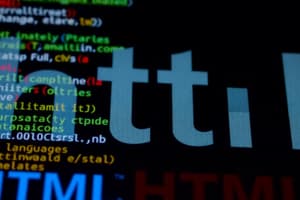Podcast
Questions and Answers
What is the purpose of the 'alt' attribute in image tags?
What is the purpose of the 'alt' attribute in image tags?
- To specify the image size
- To provide a text description for the image (correct)
- To set the image URL
- To alter the image's color properties
Which of the following correctly defines a void element in HTML?
Which of the following correctly defines a void element in HTML?
- An element that can contain other elements
- An element that has a single tag and does not require a closing tag (correct)
- An element that requires a closing tag
- An element that generates no output in the browser
What does the 'strong' text formatter typically do in a web browser?
What does the 'strong' text formatter typically do in a web browser?
- Changes the text color to green
- Places emphasis on text by bolding it (correct)
- Makes text a smaller font size
- Places emphasis on text by italicizing it
Which pair of actions would correctly create a hyperlink in HTML?
Which pair of actions would correctly create a hyperlink in HTML?
In HTML, how is emphasis typically represented in a web browser?
In HTML, how is emphasis typically represented in a web browser?
What does HTML stand for?
What does HTML stand for?
Which part is NOT included in the anatomy of an HTML element?
Which part is NOT included in the anatomy of an HTML element?
What is the purpose of CSS in web development?
What is the purpose of CSS in web development?
How does a browser read an HTML document?
How does a browser read an HTML document?
Which of the following is a valid HTML tag for a heading?
Which of the following is a valid HTML tag for a heading?
Which tag is used to create an unordered list in HTML?
Which tag is used to create an unordered list in HTML?
What does the ![]() tag do in HTML?
tag do in HTML?
What does the tag do in HTML?
What is the purpose of the <input> element in an HTML document?
What is the purpose of the <input> element in an HTML document?
Flashcards
Void Elements
Void Elements
HTML elements that consist of a single tag and do not have a corresponding closing tag.
HTML Comments
HTML Comments
Notes in HTML code that are ignored by the browser.
Image Alt Text
Image Alt Text
Descriptive text for an image, appearing if the image cannot be displayed.
Text Formatting HTML
Text Formatting HTML
Signup and view all the flashcards
HTML Anchor Tag
HTML Anchor Tag
Signup and view all the flashcards
HTML
HTML
Signup and view all the flashcards
HTML element anatomy
HTML element anatomy
Signup and view all the flashcards
HTML Rendering
HTML Rendering
Signup and view all the flashcards
HTML Element:
HTML Element:
Signup and view all the flashcards
HTML Element:
HTML Element:
Signup and view all the flashcards
HTML Element: ![]()
HTML Element:
Signup and view all the flashcards
HTML Element:
HTML Element:
Signup and view all the flashcards
Study Notes
HTML Fundamentals
- HTML stands for HyperText Markup Language
- It's the standard markup language for creating web pages
- Web pages are made up of HTML elements
- HTML elements define the structure and content of a webpage
- HTML elements are enclosed in tags
Website Components
- HTML provides the structure and content
- CSS handles styles and colors
- JavaScript controls logic and functionality
Basic HTML Structure
<html>: The root element of the page<head>: Contains meta-information about the page (title, etc.)<title>: Defines the title that appears in the browser tab<body>: Contains the visible content of the page
HTML Elements: Anatomy
- Opening tag: Beginning of an element
- Content: The text or other elements within an element
- Closing tag: End of an element
Rendering HTML Documents
- Browsers read and render HTML from top to bottom
- Elements are rendered in the order they appear in the code
Common HTML Elements
<h1>to<h6>: Headings of different sizes<p>: Paragraphs<ul>and<ol>: Unordered and ordered lists<li>: List items<a>: Anchors, creating links<img>: Images<div>and<span>: Div tag creates a block level element and Span Tag creates inline element
HTML Attributes
- Attributes provide additional information about elements
<img src="..." alt="...">: Defining an image,srcis the path to the source image,altis an alternative description- Other common attributes:
id,class,href,target,height,width
Image and External Images
- HTML includes images using the
<img>element with thesrcattribute - External images come from other websites with the full URL in
srcattribute - The
altattribute provides alternative text for the image - The
heightandwidthattributes can adjust image size
Links and Anchors
- Links, used by browsers to link to other pages
- An
hrefattribute creates a link
Void Elements
- Some HTML elements are "void" elements, meaning they don't have closing tags. A good example is the
<input>element
Comments
- Comments in HTML are ignored by the browser and are used for notes
- Use
<!-- ... -->to create comments
Formatting Text
- HTML provides tags for formatting text, like bold (strong) and emphasized (emphasis)
Lists
- Ordered lists use numbers, unordered uses bullet points
-
<ol>tag is used for ordered lists -<ul>tag is used for unordered lists -<li>tag defines each list item
Studying That Suits You
Use AI to generate personalized quizzes and flashcards to suit your learning preferences.




